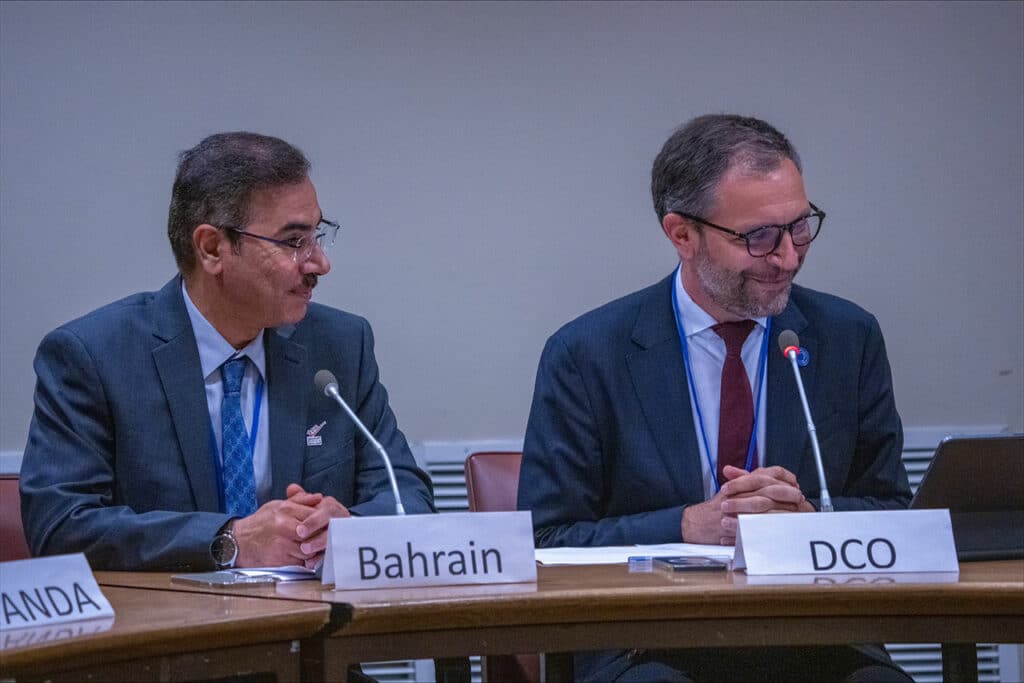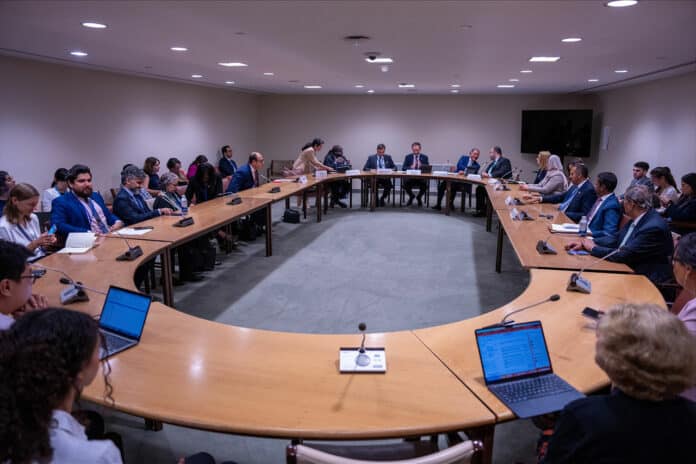Deputy Chief Executive of Electronic Transformation, Dr. Zakariya AlKhajah represented the Kingdom of Bahrain at a panel discussion titled ‘The Role of Digital Cooperation in Achieving Sustainable Development Goals (SDGs)’, held at the UN Headquarters in New York. The event coincided with the High-Level Political Forum on Sustainable Development 2023, and was attended by their Excellencies, the Minister for Housing and Urban Planning, Amna bint Ahmed Al Romaihi, and the Minister of Sustainable Development, Noor bint Ali Alkhulaif.
The Kingdom of Bahrain presented its second Voluntary National Review (VNR) report on the progress made in achieving the Sustainable Development Goals (SDGs) while exchanging knowledge and best practices on global digital cooperation.
Dr. AlKhajah highlighted Bahraini digital initiatives that directly contributed to the SDGs. He emphasized the importance of developing sustainable services and ensuring their quality, fostering public-private partnerships, strategic planning, and digital transformation. All these efforts align with and support the SDGs.
He also highlighted the Government Plan (2023-2026), which encompasses a range of policies and initiatives that are aligned with the SDGS. He talked about the significance of developing and maintaining services, ensuring their quality, fostering partnerships with the private sector, strategic planning, and digital transformation, adding that all these measures directly contribute to the achievement of the SDGs.

Dr. AlKhajah further explained Bahrain’s belief in the key role of the private sector as a partner in the development process. To support this approach, Bahrain issued a ‘Guide Regulating Partnerships between Public and Private Sectors’ that defines the process towards effective partnerships, covering service efficiency and quality through a competitive environment among private service providers, leveraging private sector expertise, attracting new investment, and generating job opportunities.
Dr AlKhajah highlighted specific areas that underwent privatization. For example, at the Ministry of Interior, minor traffic accidents are now handled by insurance companies, which issue accident reports under the supervision of the General Directorate of Traffic (GDT). In the judicial field, the private sector has been assigned the task of handling notary services adhering to Bahrain’s notary public regulations, including document registration and enhancing notary service efficiency through integrated legal controls and requirements.
Dr. AlKhajah also discussed initiatives such as delegating the task of pre-employment medical examination services for expatriate workers to the private sector, under the supervision of the Ministry of Health. Additionally, Bahrain has developed strategic partnerships with leading technology companies, including Amazon Web Services (AWS), Microsoft, IBM, and Cisco, to leverage advanced technologies, particularly cloud computing.
He provided an overview of Bahrain’s efforts to support digital transformation processes that align with the SDGs. For example, in line with No Poverty goal, the Kingdom offers eServices promoting social solidarity and poverty reduction, such as Zakat, Financial Support, and Government Subsidies assistance. To achieve Quality Education, the iGA provides services such as student exam results and the issuing of student certificates. Regarding the UN’s Goal 9, focusing on industry, innovation, and infrastructure, Bahrain established systems for building permits and record-keeping. It also supports Goal 16, emphasizing peace, justice, and strong institutions, through services such as court proceedings, prosecution services, and the Islamiyat app. Bahrain’s model for public-private partnerships contributes to achieving Goal 17 of the SDGs.
Dr. Zakariya also discussed Bahrain’s Mobile strategy, which aims to streamline the number of applications targeting individuals, investors, and visitors. The Kingdom has also built an ecosystem which provides shared government services, including a national payment platform, national gateway infrastructure, and the Government Data Network (GDN).
He highlighted Bahrain’s efforts during the pandemic, including prioritizing public health, mitigating its impact on the economy, achieving economic recovery, and ensuring financial sustainability, noting that Bahrain has successfully provided healthcare services, tests, and free vaccines to all citizens and residents during that period.
The High-level Political Forum on Sustainable Development, under the auspices of the United Nations Economic and Social Council, is held from 10th to 19th July 2023. It focuses on accelerating recovery from the COVID-19 pandemic and the full implementation of the 2030 Agenda for Sustainable Development at all levels. It also reviews the SDGs and the major efforts made towards achieving them.

